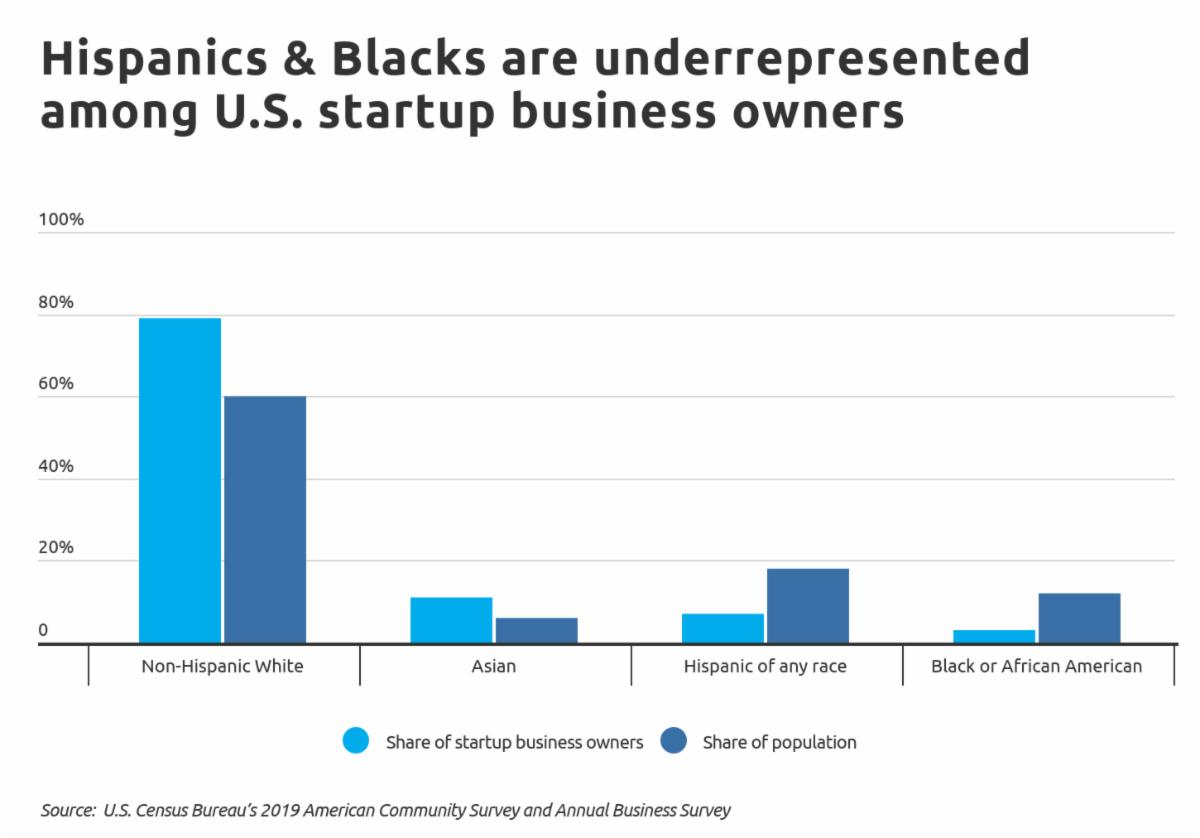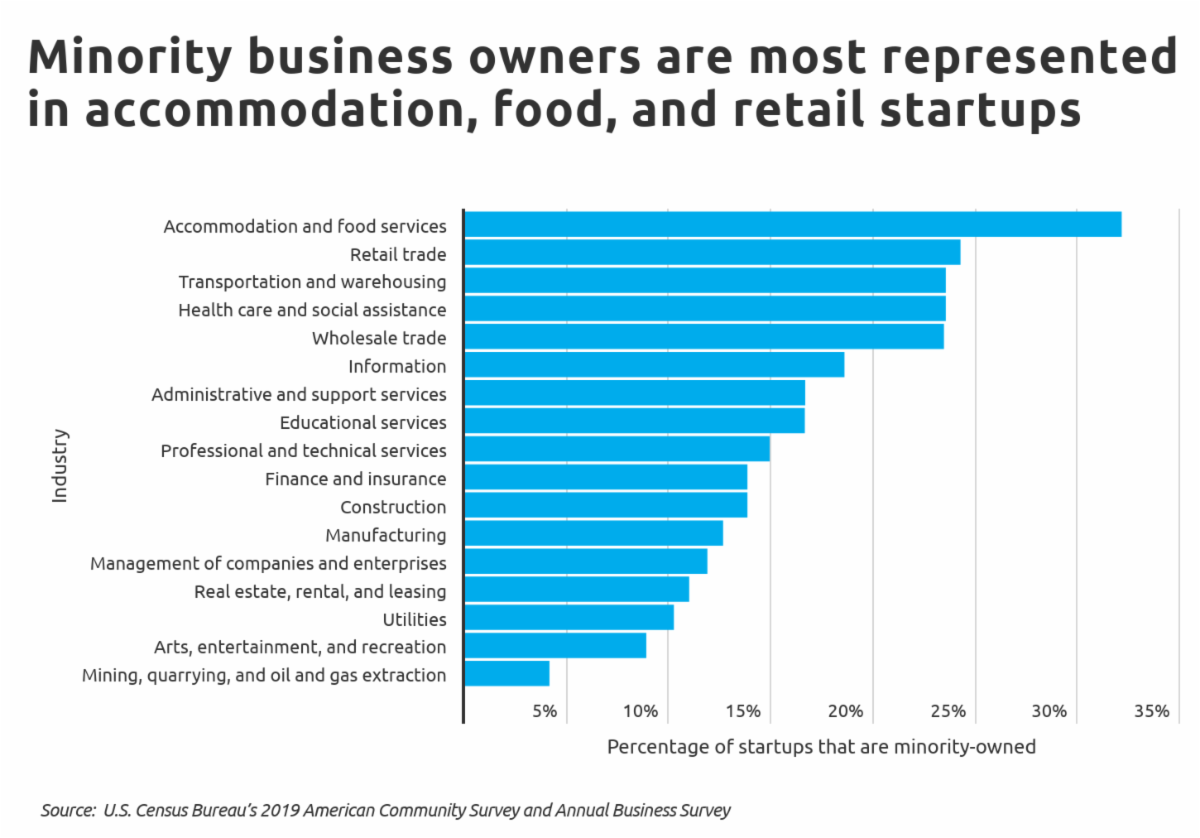Georgia Has the 7th Highest Percentage of Minority-Owned Startups in the U.S.
Tuesday, January 19th, 2021
In addition to being a critical driver of growth in the economy overall, entrepreneurship is one of the many ways that individuals can build wealth in America. But as 2020 has illustrated, opportunities to participate and succeed in the entrepreneurial economy are not equally distributed by race and ethnicity.
This year, a wave of racial justice protests nationwide and the economic repercussions of COVID-19 have drawn more attention to the struggles that minority communities face in building and sustaining wealth. According to a McKinsey analysis, two of the primary challenges facing minority business owners are structural barriers to financial health and disproportionate representation in industries most susceptible to economic shocks like those presented by COVID-19.
The first and foremost structural barrier for would-be minority entrepreneurs is access to capital. Minority households have lower pre-existing levels of wealth and savings to put towards a new business, while banks and other creditors are less likely to approve loans for Black or Hispanic small-business owners than they are for white business owners. Without upfront capital to invest in a growing business, minority entrepreneurs struggle to run and scale their operations.

The effect is that minorities are underrepresented in the startup economy relative to their share of the population. Non-Hispanic whites, who represent around 60 percent of the U.S. population, own nearly 80 percent of the nation’s startup businesses. In contrast, Hispanics of any race represent 18 percent of the population and 7 percent of startup owners, while for Black Americans those figures are 12 percent and 3 percent, respectively.
In the COVID-19 environment, another pressing issue has been the types of businesses that minority entrepreneurs are likely to lead. The industry sectors with the highest concentration of minority business owners have also been some of the industries most susceptible to the economic shocks created by restrictions to limit the spread of COVID-19.

The accommodation and food services industry—in which nearly one-third of business owners are members of minority groups—is a prime example. Bars and indoor dining have been prohibited or severely curtailed in many jurisdictions for long stretches of 2020, while demand for lodging and accommodations has cratered with more people staying at home and limiting travel. Other industries with higher shares of minority owners, like retail trade and transportation and warehousing, have likewise been affected by shutdowns and stay-at-home orders, reduced consumer demand, and supply chain disruptions. And these difficulties have been compounded by the aforementioned structural barriers, as minority business owners struggled to access government-backed COVID-19 relief measures like the Payroll Protection Program.

Despite all these challenges, today there are nearly 170 thousand minority-owned startups in the U.S., employing over 700 thousand people and generating close to $100 billion in annual revenue. Based on demographic trends, these numbers are likely to grow as the population continues to diversify on racial and ethnic lines. Unsurprisingly, states with higher minority populations—including “majority-minority” California and Hawaii—also lead in the percentage of startups that are minority-owned.
At the city level, the story is much the same. While areas with large minority populations also tend to have higher concentrations of minority-owned startups, minorities remain underrepresented in small business ownership relative to their population levels. To show this trend, researchers at Self Financial used Census data to calculate the percentage of startup businesses—defined as firms less than two years old—that are minority-owned and the minority population share in each state. Researchers also included each state’s total number of minority-owned startups, along with their number of employees and total annual sales.
The analysis found that in Georgia, minorities account for 48.18% of the total population while only 23.19% of Georgia startups are minority-owned. Out of all states, Georgia has the 7th highest percentage of minority-owned startups. Here is a summary of the data for Georgia:
-
Percentage of startups that are minority-owned: 23.19%
-
Number of startups that are minority-owned: 6,077
-
Total employees at minority-owned startups: 26,085
-
Annual sales at minority-owned startups: $3,519,149,000
-
Minority population share: 48.18%
For reference, here are the statistics for the entire United States:
-
Percentage of startups that are minority-owned: 19.98%
-
Number of startups that are minority-owned: 169,645
-
Total employees at minority-owned startups: 700,879
-
Annual sales at minority-owned startups: $97,893,814,000
-
Minority population share: 39.94%
For more information, a detailed methodology, and complete results, you can find the original report on Self Financial’s website: https://www.self.inc/blog/


